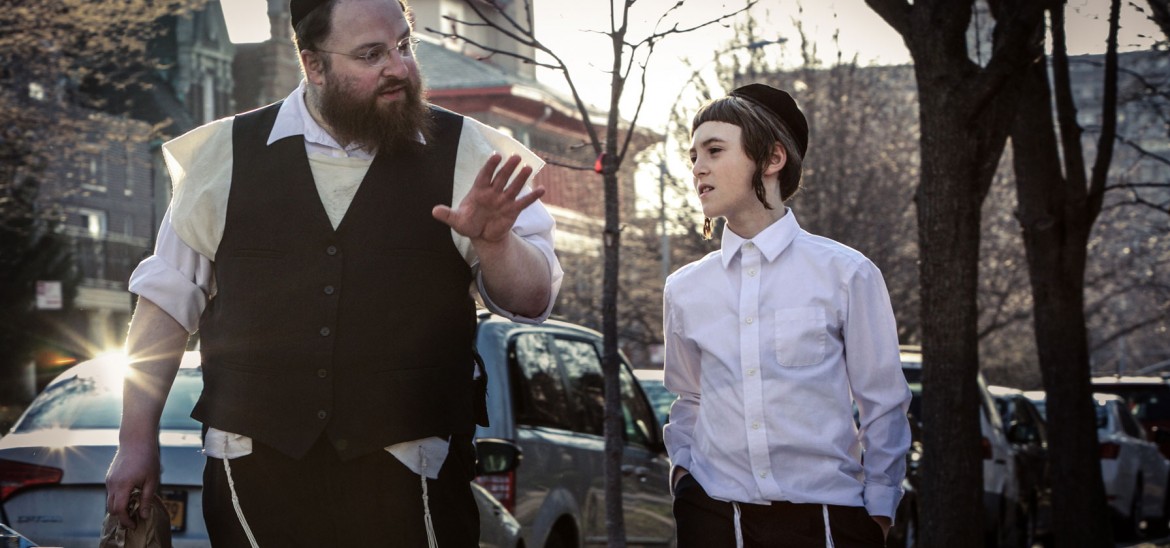Into Film Clubs
Find out everything you need to know about starting an Into Film Club.



Set within Brooklyn's ultra-orthodox Jewish community, Menashe tells the story of a recently widowed grocery clerk struggling to make ends meet and responsibly parent his young son, Rieven. Cultural tradition prohibits Menashe from raising his son alone, so Rieven is adopted by his strict uncle, leaving Menashe heartbroken. With his wife's memorial about to take place, a local rabbi grants Menashe one week living with his son, and a chance to prove himself a suitable man of faith and fatherhood.
Performed entirely in Yiddish, the first time the language has been used so extensively in cinema for many decades, the film is an intimate portrait of members of the Hasidic community. The majority of America's Hasidic Jews reside in Borough Park, New York, where this film is set. Their community is insular, and deeply conservative. Relationships with outsiders are rejected, and its leaders are firmly against outside media, meaning the likes of smartphones, the Internet and radio are mostly banned. The film's director, Joshua Z Weinstein, is a non-observant Jew who grew up fascinated with this closed-off community existing so close to him. Noticing parallels between them and his own family ancestry, he decided to make the film as a way to better understand his own cultural background.
Much of the film is also based on the lead actor's own life story. A good friend of the director (and a star on YouTube) Menashe Lustig lived in London for seven years before returning to his native New York to work as a grocer following the death of his wife, with his son living near to him in a local foster home. Somewhat controversial within the community because of his artistic ambitions, Menashe is a gifted performer, able to capture the humanity and vulnerability within himself and his wider surroundings to remarkable degrees. For him, being able to express himself artistically has been a joyous experience and helped him to process and deal with complicated emotions from his past.
At its heart, despite the very specific cultural tradition it depicts, the film is a universal story about the bond between a parent and child. Its influences include the classic child custody drama Kramer vs Kramer, acclaimed Belgian filmmakers The Dardenne Brothers' The Kid With A Bike, and Bicycle Thieves, one of the defining films of the post-war Italian neorealist movement, characterised by their telling of working-class focused stories, filmed on location, and using non-professional actors. With its simple story of a man attempting to track down a stolen bicycle with his son, Bicycle Thieves is often cited as one of the most important films ever made, and has a clear parallel with Menashe.
The film is also very specifically about New York and the bewildering number of small, insular communities that can be found within its city limits, in ways comparable to titles like West Side Story, The Warriors and Saturday Night Fever, as well as the films of Woody Allen. Much about the central character is also comedic, with Menashe being the sort of "loveable loser" audiences are accustomed to seeing in Wes Anderson films like Rushmore and The Royal Tenenbaums, and in the works of the Coen Brothers, most notably A Serious Man and the character of Uncle Arthur.
Menashe succeeds in doing what many of the most powerful films excel at: opening up closed worlds that audiences probably know very little about in remarkably accessible, empathetic ways. The ultra-conservative Hasidic community has rarely been depicted on film before, and their culture is by its nature somewhat closed-off. Yet through the relatable experiences of one man and his son, audiences have a small window into their daily lives. Having convinced the community to allow filming to take place, Joshua Weinstein's film succeeds because of its documentary-like realism, an approach born out of his background in non-fiction cinema. Moving away from often negative stereotypes, the film's portrayal of the community is one of deep humour and immense spirituality, humanising these people to an audience of outsiders, and boasting a firm commitment to authenticity.
With films such as Menashe, we are able to understand a little more about the wider world around us. By placing us so tightly into a particular sphere, it is a challenging experience, but an undeniably rewarding one.

A poor father and son search Rome for their stolen bicycle in this hugely influential '40s Italian film from director Vittorio De Sica.
Certificate
Viewing 4 of 4 related items.

Get in touch with your article ideas for the News and Views section.